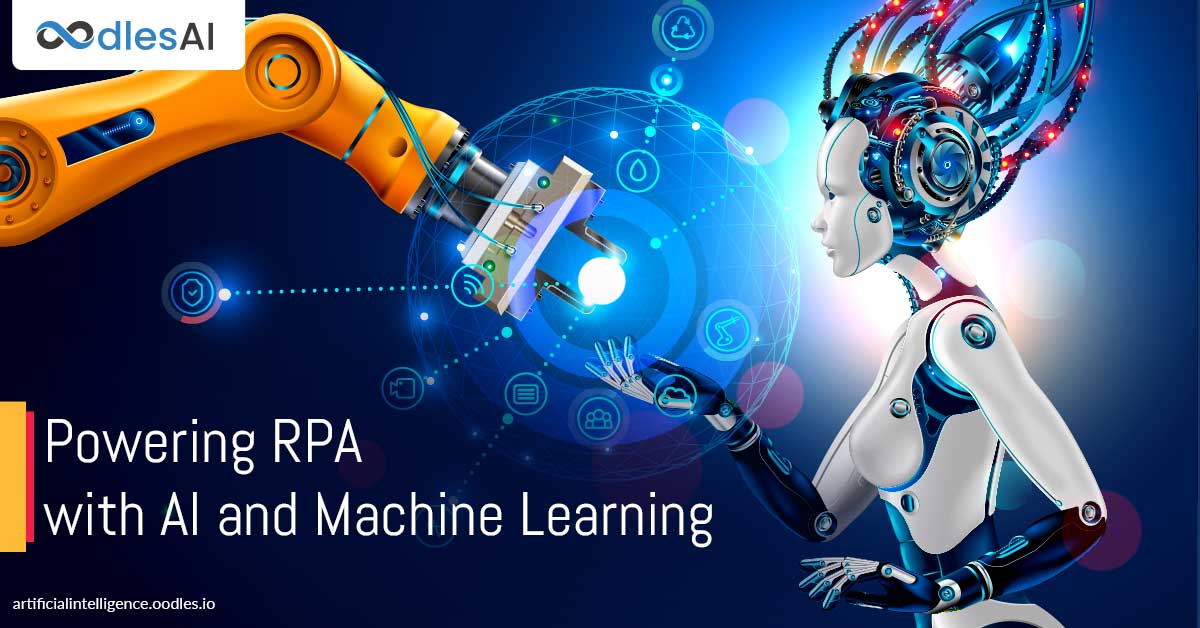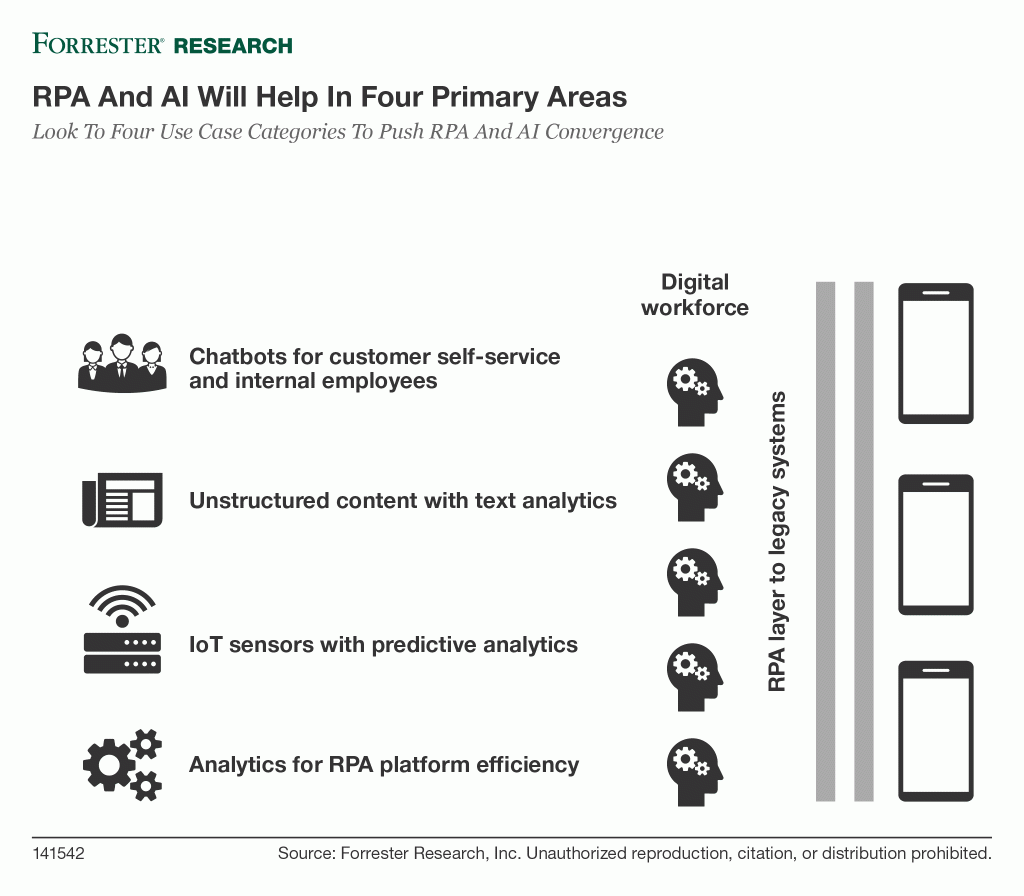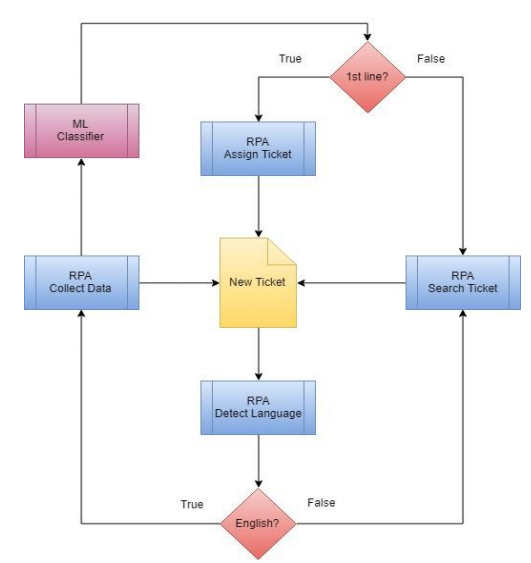Powering RPA with AI and Machine Learning For Business Automation
Sanam Malhotra | 24th July 2020

Regardless of industry, constant adoption of Robotic Process Automation (RPA) can be mapped across organizations. In a bid to save time, cost, and human effort, RPA is the most basic and convenient gateway for digital transformation. However, the advent of artificial intelligence (AI) is encouraging legacy RPA models to overcome inflexibility and become more intelligent. RPA with AI and machine learning is, therefore, making remarkable strides in industrial automation while improving customer satisfaction and revenues.
In this edition, we, at Oodles, as an evolving AI Development Company, introduce businesses to more agile process automation with machine learning.
Mapping the Strengths and Weaknesses of RPA
In recent years, the rising cost and inaccuracy at operating centers have opened a smooth inroad for Robotic Process Automation. What RPA offers is a software programmed to simulate rule-based operations such as website scraping, order processing, data transfer, and more.
The Mckinsey Global Institute projects that use of RPA technologies can automate more than 81% of physical work, 69% of data processing, and 64% of data collection activities.
The immediate benefits brought by RPA to any business expand to-
a) Lower operational costs
b) Improved quality of delivery
c) Higher employee efficiency and productivity
d) Minimum errors and increased compliance
e) Easy implementation and low barriers to integration in business models.
However, some often overlooked limitations of RPA run parallel to the automation journey, thereby slowing down business progress and scalability. These include-
a) Highly deterministic
RPA systems cannot perform well in the absence of clearly defined operations and parameters. A slight change in procedures can malfunction the entire RPA process instantaneously.
b) Limited data literacy
Robotic automation software cannot process large volumes of unstructured data that require analyzing and making independent decisions.
c) Lack of ‘smartness’
Businesses can have rigid RPA models but cannot feed them with data to evolve them into smart technologies. The rules set once are always true for an RPA system no matter how many tons of data it processes throughout.
Data literacy is where a nexus takes place between RPA and its successor- machine learning development. Let’s discover how AI injects the much-needed ‘smartness’ into RPA systems for running more scalable and intelligent business operations.
How AI and Machine Learning Power RPA
The fusion of machine learning and RPA can significantly accelerate business pathways toward the Industry 4.0 vision. While RPA streamlines mundane business processes, machine learning algorithms introduce decision-making capabilities to the systems. It is possible with algorithmic advancements enabling automated models to identify patterns from large datasets. With in-depth insights, models can self-learn to make accurate predictions and judgments.
Together, RPA and machine learning emerges as a new suite of disruptive technologies, termed as ‘Intelligent Process Automation’.
Intelligent Process Automation or IPA ropes in machine learning algorithms, analytics, natural language generators, and cognitive models to work together. A nexus of these technologies, when applied for process automation, can significantly impact productivity, scalability, and competencies of an organization.
A Forrester Research calls the convergence of RPA, AI, and machine learning as “a match made in heaven” and identifies 4 primary areas of its application, as visualized below-

With Oodles AI, let’s explore some effective use cases of RPA with AI and machine learning that are beginning to boost business intelligence exponentially.
RPA with AI and Machine Learning: Business Opportunities & Applications
RPA backed by AI not only accelerates model performance but results in completely autonomous systems that can cover for missing gaps efficiently. The Oodles AI team of AI developers elaborate on some dynamic applications of RPA with AI and machine learning-
1) End-to-end Ticket Routing System
Legacy ticket routing systems involved a rigid automation process from identifying the ticket category to routing problems to the appropriate resolver group. However, such automation systems cannot read the ticket description and take independent decisions on the resolver group.
With machine learning, RPA systems can be programmed to extract actionable text from tickets, ID cards, or emails. An ML-based backend model can use the extracted information to predict the resolver group or concerned team without human intervention.
Here is a diagrammatic representation of a similar RPA and ML-powered ticket routing system proposed by engineers of Metropolia University of Applied Sciences.

Moreso, machine learning algorithms can not only analyze unstructured ticket content but also take it a step further with sentiment analysis.
Also read | Artificial Intelligence in Banking: From Analytics to Applications
2) IoT Data Analytics for Supply Chain Management
Recent advancements in RPA systems channel a seamless interaction between RPA software and IoT devices. IoT has reserved a sweet spot across supply chain operations through product tracking and authenticating sensors, GPS-controlled shipment, etc.
Data collected from mobile IoT devices, sensors, trackers, and GP systems become a powerhouse for machine learning to strengthen automation.
From order processing and payments to demand forecasting and customer services, the evolution of RPA in supply chain management is booming thanks to machine learning. Here’s a step-by-step guide to implementing RPA with AI and machine learning to build smart supply chains-
a) Analysis of inventory data from trackers to trigger automated demand forecast through ML algorithms
b) Evaluation of vendor documents to automate credit risk management for vendor selection
c) Communication of shipment status via rule-based virtual agents, and more.
In addition, machine learning with RPA can break through the current standardization challenges faced by a majority of supply chains today.
Also read | The Convergence of Big Data and AI to Augment Business Intelligence
Oodles AI: Your Automation Partner for Implementing RPA with AI and Machine Learning
We, at Oodles AI, are a team of skilled AI software architects and data scientists who harness emerging technologies to innovate legacy systems. Our profound knowledge in machine learning and its algorithms enables enterprises to automate critical processes with ease, efficiency, and accuracy. We deploy the most agile RPA software backed by ML algorithms to build-
a) Automated text extraction systems or AI-powered OCR for Receipt Digitization
b) Intelligent customer support agents for routine queries
c) Deep video analytics for real-time CCTV footage, and more.
Team up with our AI experts to deploy powerful RPA models driven by our artificial intelligence solutions.



